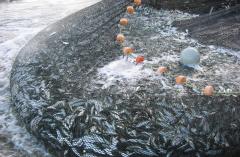Activity FieldsActivities of The Association of Environmental Justice in Israel
Understanding Democracy - Environment Interface
Achim Halpaap, UNITAR
| Sunday, 01-Jun-2008
understanding_democracy_environment_interface_in_environmental_policy_and_law_38.62008.pdf
Understanding Democracy and Environmental governance
Conference on Environmental Governance & Democracy
Institutions, public participation and environmental sustainlability: Bridging research and capacity development
UNITAR - Yale University
| Saturday, 10-May-2008
Call on the European Parliament to support transparency of the EU external fishing fleet
Access Info Europe
| Monday, 23-Jan-2017
The Regulation on the sustainable management of external fishing fleets will set up an EU-managed public register of authorisations for vessels fishing outside EU waters, and has already been approved by the Parliament’s Fishing (PECH) and Development (DEVE) committees.
A key feature of this future register is that it will include details on the “beneficial” – the ultimate or real – owners of fishing vessels, making it easier for both law enforcement, watchdog civil society organisations, and journalists to track who is really behind illegal fishing.
The forty plus civil society groups, including leading global organisations working on transparency and accountability, note in the letter to MEPs that transparency is essential: fishing by EU-flagged vessels in the waters of developing coastal States in the Atlantic, Indian and Pacific Oceans and off the coast of West and Central Africa, aided by EU funds of EUR 145 million annually, has a significant impact on the conservation and management of global fish stocks.
“The need for beneficial ownership information about all types of commercial activity became patently clear after the Panama Papers scandal last year,” stated Helen Darbishire, Executive Director of Access Info Europe.
“This regulation is part of a global trend to increase transparency about the owners of companies operating in an increasingly complex globally economy so that we can combat tax crime and corruption.” added Darbishire.
The letter to MEPs notes that the Regulation on sustainable fishing is in line with the current position of the European Parliament on fighting money laundering, as well as with recommendations from the Organisation for Economic Co-operation and Development and United Nations Office on Drugs and Crime.
Countries such as the UK, Slovenia, Denmark, France, Bulgaria and the Netherlands have set up or are currently setting up public databases. Other countries have recently made pledges to do so in fora including the G8 (2013), the G20 (2014) and the Open Government Partnership Summit (2016).
AEJI is among the dozens of organisations signing up to the letter to MEPs are those specialised in environmental protection (Oceana, Greenpeace, Bloom, Environmental Justice Foundation, Good Fish Foundation, Marine Conservation Society) as well as leading transparency and accountability groups (Access Info Europe, The Engine Room, Global Financial Integrity, Global Witness, Open Corporates, the Sunlight Foundation, the Open State Foundation, the UNCAC Coalition and the World Resources Institute).
letter-to_european_parliament_to_support_transparency_of_the_eu_external_fishing_fleet_january_2017.pdf
Call on the European Parliament to support transparency of the EU external fishing fleet
TAI calls on Government of Kenya to provide security and justice for environmental human rights defenders
The Access Initiative
| Monday, 20-Mar-2017
tai_letter_to_kenyan_government_march2017.pdf
TAI calls on Government of Kenya to provide security and justice for environmental human rights defenders


